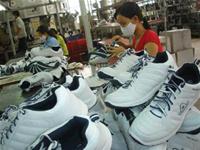
| Footwear exports to see more pressure from EU | |
Experts have forecast that heavy pressure is in store for Vietnamese footwear exported to the EU in 2009, when the tariff is raised. The tax burden While the anti-dumping tax on leather-capped shoes exported to the EU is already burdening Vietnamese enterprises, on January 1, 2009, Vietnamese enterprises will face a new challenge: EU import countries will remove the GSP (Generalised System of Preferences) on Vietnamese products. According to Nguyen Thi Tong, Deputy Chairwoman of the Vietnam Leather and Footwear Association (Lefaso), when the GSP is removed, the tax rate will be raised from 4.5% to 8% on leather-capped shoes, from 7.5-8% to 11.5% on leatherette shoes, and from 11.5% to 17% on canvas shoes. Vietnamese enterprises will have a lot of difficulties getting orders, maintaining production and ensuring production and incomes for labourers. Dinh Thu Ngan Tuyen, Deputy Director of HCM City-based Nhi Hiep Company, said that she still cannot calculate how heavily the tax increases will affect the company’s $4mil a year in exports. However, she knows for sure that with the new tax rates, and increasing input material prices, enterprises will have to re-consider input production costs. However, Nhi Hiep, and many other footwear companies, just do the outsourcing for foreign partners; therefore, it is difficult for them to adjust processing prices. The unit processing price now proves to be very low, just $1.1/pair of shoes. If Vietnamese enterprises raise prices, they may lose clients; if they don’t raise prices, they will likely suffer losses. According to Tong, the GSP will be removed from 2009 to 2011. After that, the European Commission (EC) will consider whether to reinstate it or not. Enterprises need to rescue themselves In January 2009, a delegation of experts from EC will start the anti-dumping investigation against Vietnam-made leather-capped shoes, according to Bui Son Dung, Deputy Director of the Competition Administration Department (CAD) under the Ministry of Industry and Trade. Dung added that this will be the final check in consideration of whether to remove the anti-dumping tax. He said that if enterprises can prove that they operate in market economy conditions, they will be exempted from the anti-dumping tax. A Chinese business has been successful in a similar case. EC schedules to make the final decision in mid 2009. Until the final decision is made, Vietnamese exporters will still bear the current anti-dumping tax rates. Three Vietnamese enterprises have been selected for the investigation. “The selected enterprises represent Phan Thi Dieu Ha, Deputy Director of the Import-Export Department under the Ministry of Industry and Trade, has said that Vietnamese enterprises always make mistakes in declaring imports and exports. Meanwhile, Tong also said that Vietnamese enterprises should provide detailed and accurate information which fits with international practice, adding that this is the most effective measure to help them refute accusations of dumping products in the EU market | |
| Tien phong |
